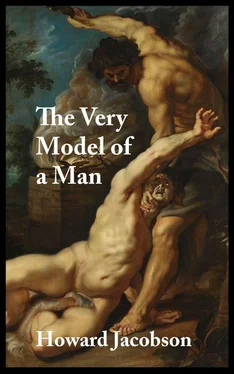Had he known what Cain was actually thinking throughout the girl Zilpah’s woodpecker ministrations, Sisobk would doubtless have been horrified. Killing a brother is one thing; not loving women — not loving woman is quite another.
Although he doesn’t attach a high value, while it is happening, to being beaten by Anatolians, Cain rather enjoys the sensation afterwards of steam wisping and weeping over his broken skin.
It isn’t only mould that brings him to the baths. Water remains a luxury to wanderers long after they’ve stopped wandering, and Cain cannot immerse himself too often. He loves the superstructure of bathing, too: the hissing pipes, the furnace chimneys, the high windowless walls, the tiles, the stacks of laundered towels. Hard to believe, here, that water was first divided from water by God. And that’s another argument for coming to the Anatolian bathhouse: it persuades you that water is a substance made by men.
He sits on a slatted bench and gives his thoughts up to the vapours. He sits, vapid, for too long. A steam room is not the place to clear the mind of mildew. One more minute, he promises himself, and I will shower cold. And then he perceives he is not steaming alone.
‘Thought I might catch you here,’ a voice like gargling announces.
Cain wonders if he might get away with not looking up, not noticing he is being spoken to, pretending to be occupied, deaf, dead. But he feels the bench sag under the weight of another body, and registers that a foot identical to his foot, but not his foot, has entered his field of vision.
He is relieved at least that the foot is naked, and therefore isn’t likely to be the prophet’s. In which case he is just about prepared to meet civility halfway. I’ll talk if I have to, he agrees, but only to the foot.
‘That’s twice so far I’ve seen your lips move,’ the voice says. ‘But since you obviously weren’t addressing me, dare I hope that you were communicating with God?’
And now Cain knows to whom the toes identical to his toes belong. They belong to Preplen, and are being shown as evidence — that’s horribly apparent now — of their common Edenite inheritance. Look — we even cut our toe-nails the same!
‘You can hope what you like,’ Cain says. ‘But God is the last person I come here to find.’
‘Whatever you say. I don’t know about “person”, but whatever you say. Get my note?’
‘I got your note.’
‘Read it?’
‘I read it.’
‘Like it?’
‘Like it!’
‘The writing.’
‘Was I meant to?’
‘No… yes. When a poet pens a little something to you…’
‘It wasn’t in verse.’
‘Verse! Verse! Who’s to say what’s verse? Anyway, the enclosures were.’
‘Ah, yes — those.’
‘Ah, yes — those! Can I have them back, then?’
Cain gestures to his nakedness, establishing that he has none of Preplen’s poems about his person.
‘Of course, had I known you were going to be here…’ he says.
‘… you would have been prepared to look at me.’
‘I’m looking at you.’
‘You’re looking at my foot.’
‘Isn’t that enough?’
‘Is it enough for you?’
‘It’s plenty for me.’
‘Do you like what you see.’
‘A foot’s a foot.’
‘Ha! A foot’s a foot, is it? It’s easy to see you’re no poet. Shall I tell you what a foot is? And we can take yours if you’re not impressed with mine, although there’s hardly any… I’ll tell you what a foot is — it’s God and the Devil… it’s air and lead… it’s your wherewithal to soar above the earth and the reason you don’t… it’s a star and a stone… it’s a ladder and a shovel… it’s a cloud and a boat… The one thing it isn’t is a foot!’
‘In my case,’ Cain says, more lead than air, more stone than star, ‘the only thing it is is a foot. You forget how much walking I’ve done.’
‘Forget! Me! How could I forget? Who knows the distances you’ve travelled better than I do? Do you want me to tell you how many paces it is, heel to toe, from here to Eden?’
And he is up before Cain can answer, measuring like a mad thing, as if he intends to pace it out, foot over foot, the long journey Cain has made from something Preplen thinks was worthy to something Preplen thinks is not.
Cain looks at him for the first time, vanishing and appearing again through the steam, a naked twisted gnome with a bad neck and hollow buttocks and Cain’s feet. And Cain wonders, is this an old man or a young man?
This is not idle musing. Or vanity. Cain is not comparing bodies. For Preplen’s age has serious bearing on his claim that he and Cain were once near-neighboured. If he is an old man, if he is Cain’s senior, then where was he in the days when Cain still had a brother? Why hadn’t Cain heard of him? If he is a young man, whose issue is he?
The question Is this an old man or a young man? therefore means Is this man family?
Encouraged by the steam, more fungus grows on Cain.
As bright and as nervous as budgerigars, the barbers flutter about the entrance to the shop, mystified by the non-appearance of their best customer. They look up and down the street. They toss their heads back and regard the sun, estimating its angle. Almost evening. Then where is he? He has been in three times today — twice in the morning for shaves, once at lunchtime for towels. But that last visit is now four… five hours ago.
‘Well, I’m not touching him if he doesn’t come soon,’ says one, a junior washer and latherer with eyes as dark and beautiful as wounds. ‘Can you imagine the state he’ll be in.’
They try to imagine.
‘Egregious.’
‘Flagrant.’
‘Gross.’
‘In need of fumigation.’
‘In need of despumation.’
‘In need of defoliation.’
Much merriment from the budgerigars, great excitement occasioned by the similarity of this word to another.
Laughter rises, but dies quickly. An atmosphere of desuetude descends upon the shop. You would think the barbers hadn’t worked for centuries. They stare at curls of hair lying unswept around their feet as though they have never before seen such things and hesitate to approach them in case they’re dangerous. They examine combs minutely. They look into mirrors and make circles of their mouths. They push their sleeves up, then roll them down again, and make similar adjustments to their pantaloons. Just so much skin, and no more, must be visible. Just so much as will implant the suggestion, but not quicken the thought, that barbers are vulnerable to pain.
Faced with this fever of inactivity, Sisobk the Scryer suspects he has come to the wrong place. He has had his head around the door a full five minutes before anyone notices he’s there, and even then no one is in any hurry to attend to him.
He is looking for Cain, has Cain on his mind, and so does what he thinks Cain would do. Coughs.
Affronted, the barbers, one by one, look up.
‘Closed,’ they say.
‘Too late.’
‘Too busy.’
‘Too particular.’
‘Unless,’ says one, ‘you would like us to see what we can achieve with your moustache.’
‘Assuming we can find it,’ says another.
‘And that we don’t accidentally blow it off,’ puts in a third.
‘Like… so!’ they say, huffing together.
Sisobk the Scryer doesn’t like it here, but he was sure he was going to find Cain tilted back in a chair, perhaps under towels, perhaps with a razor at his throat, but in any event ill-placed to offer resistance — and now he doesn’t know how to fill the tickling hollow in his expectation. ‘Can I wait for him?’ he asks.
Читать дальше











